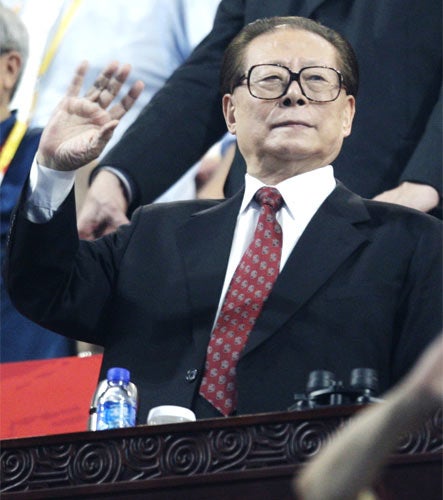China cracks down on internet rumours of Jiang Zemin's death

Your support helps us to tell the story
From reproductive rights to climate change to Big Tech, The Independent is on the ground when the story is developing. Whether it's investigating the financials of Elon Musk's pro-Trump PAC or producing our latest documentary, 'The A Word', which shines a light on the American women fighting for reproductive rights, we know how important it is to parse out the facts from the messaging.
At such a critical moment in US history, we need reporters on the ground. Your donation allows us to keep sending journalists to speak to both sides of the story.
The Independent is trusted by Americans across the entire political spectrum. And unlike many other quality news outlets, we choose not to lock Americans out of our reporting and analysis with paywalls. We believe quality journalism should be available to everyone, paid for by those who can afford it.
Your support makes all the difference.There was mounting speculation last night over the health of the retired Chinese supreme leader Jiang Zemin after censors stepped up efforts to block online postings suggesting that he had died.
Although the 84-year-old former president, car-factory manager and Soviet-trained technocrat no longer held any official positions of power, he holds residual influence within the old guard at the top of the Communist Party.
His failure to appear at last week's celebrations to mark the 90th anniversary of the Communist Party's founding was seen as suspicious. There has also been much activity around the People's Liberation Army hospital in Wukesong, which is often read as a sign that a major figure has died or is dying. There have been rumours about his poor health for years but censors have lately started blocking all references to his name.
The internet blocks shows just how secretive the group of men who run the world's most populous nation is about power and succession issues, although the times when a whiff of intrigue about a leader's death would lead to a shutdown at the core of the political leadership in the Zhongnanhai compound – which houses the party headquarters in Beijing – are long gone.
The Communist Party's two main leaders, President Hu Jintao and Premier Wen Jiabao, are expected to step aside next year but the 80-million-member Party dislikes any form of potential instability ahead of a big succession and keeps a tight grip on the flow of information.
A former mayor of Shanghai, Mr Jiang was chosen from relative obscurity by then-supreme leader, Deng Xiaoping, as a replacement for the reforming party boss Zhao Ziyang.
Mr Zhao was ousted for sympathising with the democracy movement crushed by the army in Beijing in June 1989, and for prompting an internal power struggle that nearly tore the Party apart. Mr Jiang was expected to be a transitional figure – a safe pair of hands – but he showed remarkable political nous, holding onto power for 12 years and continuing to wield influence as chairman of the powerful Central Military Commission for several years after he had been expected to cede it to Mr Hu.
Despite his technocrat image, under Mr Jiang's tutelage China had its longest period of stable economic growth under Communist rule. The country also entered the World Trade Organisation and won the right to host the 2008 Olympics in Beijing. Well-known for his ability to successfully outflank his rivals, he proved adept at imposing himself on the bureaucracy and gave himself plenty of profile abroad. His rendition of Elvis Presley's "Love Me Tender" at a meeting in Manila is legendary.
Searches for "Jiang Zemin" in Chinese or simply "Jiang" – which translates as "river" – prompted warnings on Weibo, China's version of the banned Twitter site, that the search was illegal. Hong Kong television reported his death last night, but there was no information from official channels in mainland China.
Join our commenting forum
Join thought-provoking conversations, follow other Independent readers and see their replies
Comments